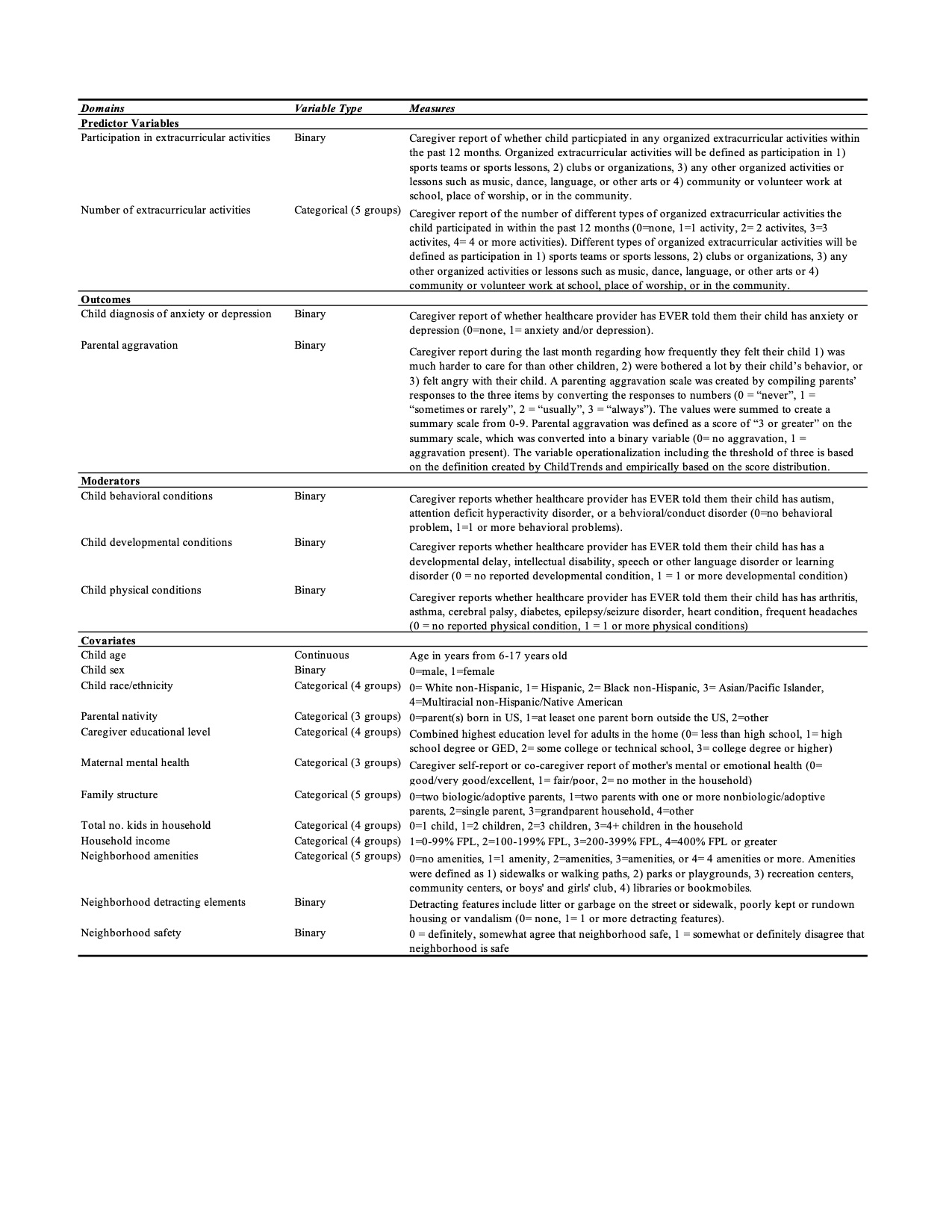Mental Health
Category: Abstract Submission
Mental Health II
539 - Extracurricular activities, parental aggravation, and child mental health - a national cross-sectional study
Monday, April 25, 2022
3:30 PM - 6:00 PM US MT
Poster Number: 539
Publication Number: 539.423
Publication Number: 539.423
Jaime La Charite, UCLA and Cedars Sinai, Redondo Beach, CA, United States; James Macinko, UCLA Fielding School of Public Health, los angeles, CA, United States; Rebecca Dudovitz, University of California Los Angeles, Los Angeles, CA, United States

Jaime La Charite, MD MPH (she/her/hers)
Fellow
University of California, Los Angeles David Geffen School of Medicine
Redondo Beach, California, United States
Presenting Author(s)
Background: Extracurricular activities (EA) benefit child health, but the impact on children with health conditions and their caregivers remains unknown. Specific EA programs reduce internalizing symptoms in at-risk children, but less is known regarding general EA and mental health of children with and without health conditions or whether EA reduce parental aggravation, which is associated with poor child mental health.
Objective: Is participation in EAs associated with a reduced odds of child anxiety and depression and parental aggravation? Do relationships vary by child health conditions?
Design/Methods: We conducted a secondary analysis of the 2019 National Survey of Children’s Health, a nationally representative sample of non-institutionalized children and their parents. We used responses from parents of children aged 6-17 regarding their child’s EA participation, parental aggravation, child health and contextual factors (Table 2). Weighted logistic regressions tested associations between EA and 1) parental aggravation and 2) child anxiety and depression diagnoses, controlling for covariates. Interaction terms tested whether associations were moderated by child health conditions. Sub-analyses explored whether results varied by type of EA.
Results: In our weighted sample of 21,259 children, 82.2% had at least one EA, 14.3% were diagnosed with anxiety and/or depression, 4.8% of parents reported parental aggravation (Table 1). Multivariate regression, controlling for covariates, revealed EA participation was associated with decreased odds of parental aggravation (AOR 0.6, p < 0.01) (Figure 1), with the largest effect size among children with 3 types of EA and similar associations across activity types. Any EA was not associated with child mood diagnoses (Figure 2), but a dose-response relationship was observed with reduced odds of depression and anxiety among those with at least 3 EA. Associations were moderated by activity type with participation in sports (AOR 0.6, p< 0.001) or clubs/organizations (AOR 0.8, p=0.04) associated with reduced odds of anxiety and depression and lessons in the arts or other organized activities associated with increased odds (AOR 1.2, p =0.04). All results were similar for children with versus without physical, developmental, and behavioral health conditions.Conclusion(s): Increasing access to EA may be important to improving child mental health and family functioning. Consideration for the types of EA may be needed. Given the limitations inherent in a cross-sectional study, further research is also warranted.
La Charite, Jaime CVCV_La Charite J.pdf
Table 2. Variable table with variable domains, type, and measures for variable operationalization. FPL = federal poverty limit. No = number.
FPL = federal poverty limit. No = number.
Objective: Is participation in EAs associated with a reduced odds of child anxiety and depression and parental aggravation? Do relationships vary by child health conditions?
Design/Methods: We conducted a secondary analysis of the 2019 National Survey of Children’s Health, a nationally representative sample of non-institutionalized children and their parents. We used responses from parents of children aged 6-17 regarding their child’s EA participation, parental aggravation, child health and contextual factors (Table 2). Weighted logistic regressions tested associations between EA and 1) parental aggravation and 2) child anxiety and depression diagnoses, controlling for covariates. Interaction terms tested whether associations were moderated by child health conditions. Sub-analyses explored whether results varied by type of EA.
Results: In our weighted sample of 21,259 children, 82.2% had at least one EA, 14.3% were diagnosed with anxiety and/or depression, 4.8% of parents reported parental aggravation (Table 1). Multivariate regression, controlling for covariates, revealed EA participation was associated with decreased odds of parental aggravation (AOR 0.6, p < 0.01) (Figure 1), with the largest effect size among children with 3 types of EA and similar associations across activity types. Any EA was not associated with child mood diagnoses (Figure 2), but a dose-response relationship was observed with reduced odds of depression and anxiety among those with at least 3 EA. Associations were moderated by activity type with participation in sports (AOR 0.6, p< 0.001) or clubs/organizations (AOR 0.8, p=0.04) associated with reduced odds of anxiety and depression and lessons in the arts or other organized activities associated with increased odds (AOR 1.2, p =0.04). All results were similar for children with versus without physical, developmental, and behavioral health conditions.Conclusion(s): Increasing access to EA may be important to improving child mental health and family functioning. Consideration for the types of EA may be needed. Given the limitations inherent in a cross-sectional study, further research is also warranted.
La Charite, Jaime CVCV_La Charite J.pdf
Table 2. Variable table with variable domains, type, and measures for variable operationalization.
 FPL = federal poverty limit. No = number.
FPL = federal poverty limit. No = number.